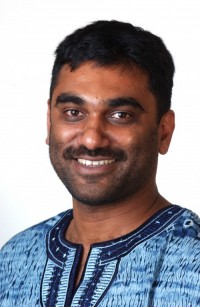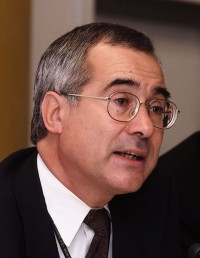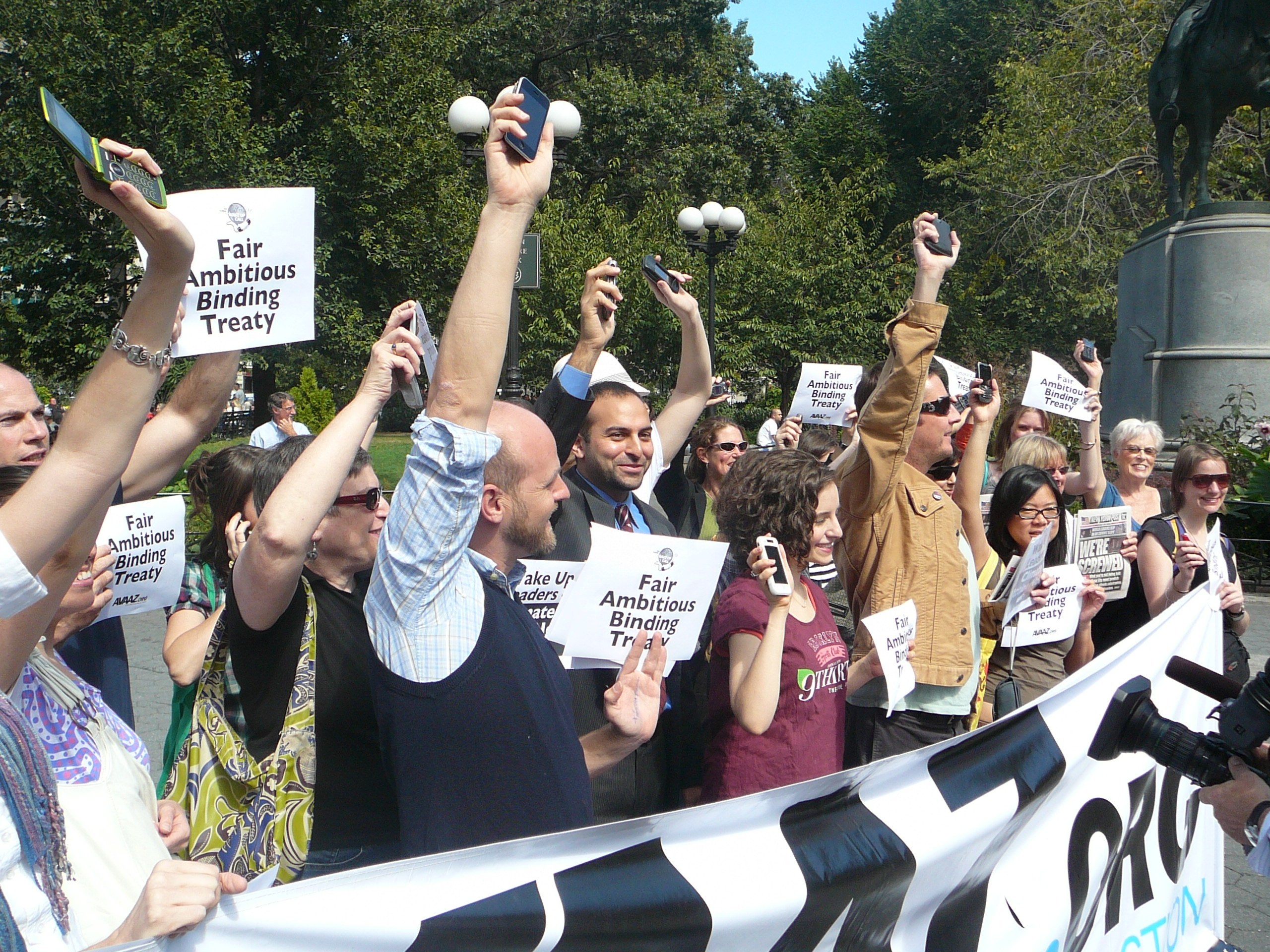 Kumi NaidooKumi Naidoo and Lord Nicholas Stern couldn’t be more different when it comes to climate action. One is chair of a worldwide citizen activist coalition; the other an economist and academic.
Kumi NaidooKumi Naidoo and Lord Nicholas Stern couldn’t be more different when it comes to climate action. One is chair of a worldwide citizen activist coalition; the other an economist and academic.
But each is a cautious optimist when it comes to international action on climate change: While it may not be probable that world leaders will forge a strong international climate treaty this year, it’s still possible. And citizen pressure is the key.
One day before the United Nations’ day-long Climate Summit on Sept. 22–which features President Obama’s hotly anticipated first address to the U.N.–Naidoo sat down to talk with journalists and bloggers about the global tcktcktck campaign, a coalition of several global non-governmental organizations (NGOs).
The name tcktcktck is meant to evoke the sound of a clock ticking down to December’s international climate treaty talks in Copenhagen. The group has been organizing periodic citizen activist “mobilizations” around the world, featuring creative street performance–style protests coordinated via online social-media tools.
The worldwide citizen actions, including Sept. 21’s Global Climate Wake-up Call, have been timed to coincide with major climate and economic meetings around the world. Ever the optimist, Naidoo believes that “if the mobilization really peaks in the coming weeks … then the momentum could shift considerably.”
Naidoo acknowledges that expectations among both negotiators and activists about the likely outcome of the December talks are growing increasingly pessimistic. Even so, he believes that there’s still time to create a different outcome. “If we can change the context of the political world” by turning out hundreds or thousands of people to demand climate action, he says, “we know that failure to act will be an electoral liability for a lot of nations.”
Turning out citizens is also crucial for the civil-society campaigners who will be at Copenhagen, he says, to prove that there’s a sizable global constituency in support of strong action on global warming. “Otherwise, why should any of these leaders listen to us? We have to show that citizens are behind us.”
Asked about what American climate advocates, in particular, could be doing in coming weeks, Naidoo acknowledged that the battle over health-care reform has sucked up most of the nation’s political oxygen. As a result, he said, “the first challenge is to be able to open up some space,” and refuse to accept that climate legislation cannot progress until health care is resolved.
He believes that American climate campaigners might pry open that space by allying more closely with the city and state governments that enacted progressive climate policies during the “last eight years of Bush administration denialism” about global warming.
He also advises climate advocates to make their arguments in plainer language for citizens who may not know a lot about the issues, and to revamp their media strategies. “My reading of the U.S. is that, insofar that you can call it a democracy, it’s an electronic democracy,” says Naidoo. “What people hear on talk radio, what they see on mainstream TV channels … part of the campaign here has to be getting smarter about penetrating the media that has the ability to shape national consciousness,” even if that means getting down and dirty with Fox News.
“If I was in the U.S. right now,” said Naidoo, “I would find 10 of the most well-endowed financial folks who get it, and ask them to put serious money on the table for a serious media effort. Take the thing to a different level.”
A Stern talking-to
 Sir Nicholas SternLater in the day, Lord Nicholas Stern expressed a similar guarded optimism on global climate action before an audience of academics and students at Columbia University.
Sir Nicholas SternLater in the day, Lord Nicholas Stern expressed a similar guarded optimism on global climate action before an audience of academics and students at Columbia University.
Stern, who famously quipped that climate change is “the biggest market failure in financial history,” is the author of an influential 2006 report on the economic implications of climate change. In it, he predicted that while it is possible to significantly reduce greenhouse-gas emissions in the coming years, it will not be cheap. He estimated the cost to be around 2 percent of the world’s annual gross domestic product (GDP). But on the plus side, grappling successfully with global warming would open up unprecedented opportunities for ending poverty and creating sustainable economic growth, he argues.
“I think this is a story of investment opportunity,” Stern said on Monday — specifically, investments in new technologies that will cut across the whole of the global economy and create “the most dynamic period of economic growth that we’ve probably seen in the whole of economic history.” Not to mention the fact that sufficient reductions in greenhouse-gas emissions mean significantly less risk of the massive droughts and floods that displace millions, escalate conflicts over food and other resources, and intensify world poverty.
According to Stern, the two key challenges of this century are overcoming poverty in the next 20 to 30 years, and managing climate change in order to slash emissions from 2020 onwards. “It’s quite clear from the structure of both problems that you have to act on them now,” he says.
And like Kumi Naidoo, Lord Nicholas Stern believes that political leaders will be best motivated to act on climate change when they are held accountable by their own citizens.






